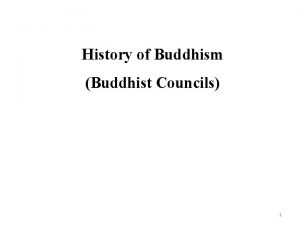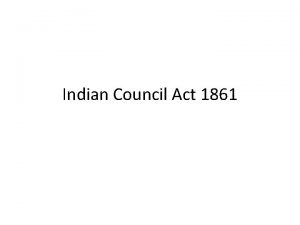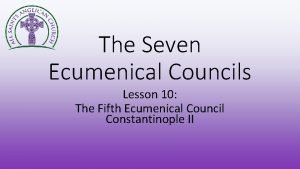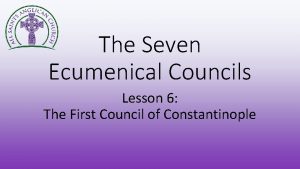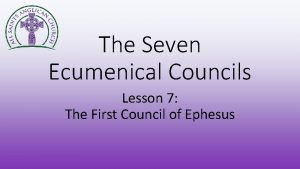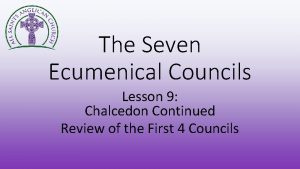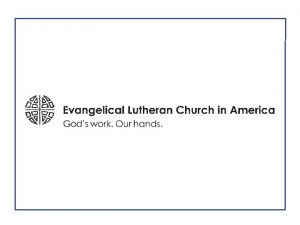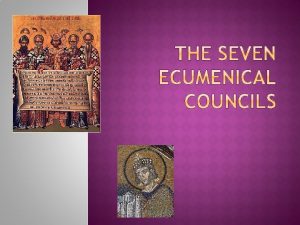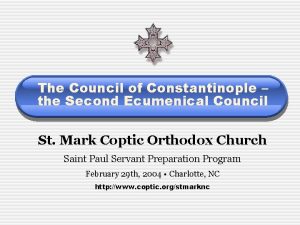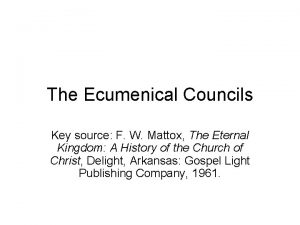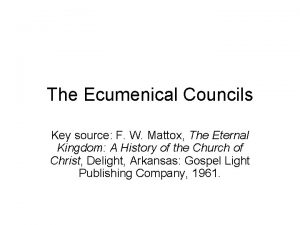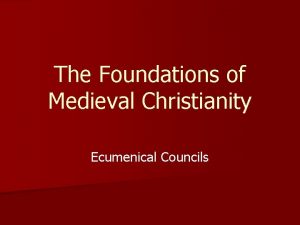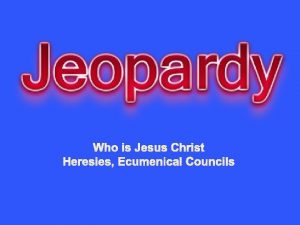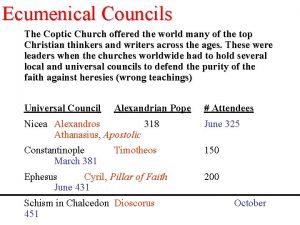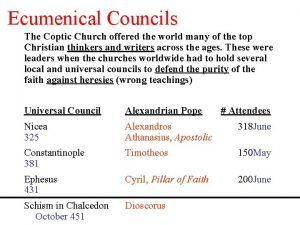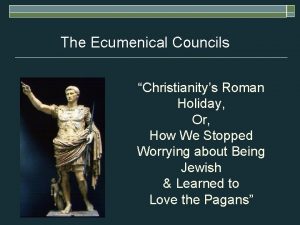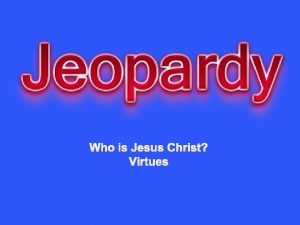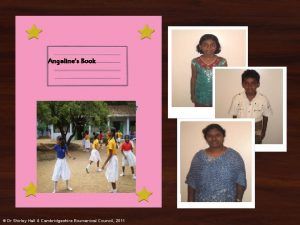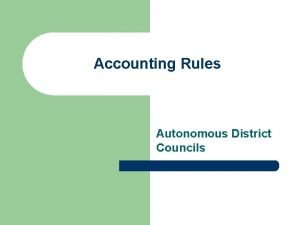The Seven Ecumenical Councils Lesson 8 The Council
























![Canons of Chalcedon 14. Cantors or Lectors [minor orders] who have married by schismatics, Canons of Chalcedon 14. Cantors or Lectors [minor orders] who have married by schismatics,](https://slidetodoc.com/presentation_image_h/20501f74f49a6002fdbfe775f667a223/image-25.jpg)






- Slides: 31

The Seven Ecumenical Councils Lesson 8: The Council of Chalcedon

Background to the Council

Background to the Council • Council of Ephesus, 381 • Pelagius condemned – Rome • Nestorius condemned – Alexandria • Two Natures of Christ affirmed – Antioch

Background to the Council • Alexandria & “One Nature after the Union” - Cyril • Antioch assumed this had died; it had not • Dioscorus • Cyril’s successor in Alexandria • Renewed One Nature debates, despite Ephesus’ Ruling • Theodoret of Cyrus • Likely to become Patriarch of Antioch • Treated Ephesus as a one-sided Antiochene victory

Background to the Council • Eutyches / Eutychean Controversy • Elderly monk in Constantinople • Favored Alexandrian theology • Took it further: “two natures before the union, one nature after” • Appeared to Antiochenes as a rejection of Christ’s humanity

Background to the Council • “Drop of wine in the ocean of deity” • Probably meant that Christ’s body was “deified” because of the Union • I. e. , Logos transformed the humanity, but not the other way around • Implied revival of Docetism? • Hybrid human/divine nature

Robber Synod of Ephesus, 449

Robber Synod, 449 • Dioscorus manipulates bishops in Constantinople to condemn Eutyches in a synod in 448 • Was acting from false motives • Gave Eutyches refuge in Alexandria • Force a confrontation with Antioch & the Patriarch of Constantinople • Eutyches is condemned at the synod, Council is planned for 449 to settle things

Robber Synod, 449 • Eutyches appeals to the Pope • Dioscorus uses Alexandrian wealth to sway the Emperor • Flavian, Bishop of Constantinople is caught in the middle • Had to support the Synod – his bishops • Had to support the Emperor, who was being bought by Alexandria

Robber Synod, 449 • Dioscorus thinks he’s won before the fight • Brings heavily armed gang of monks, just in case; gains control • Eutyches and the two natures are affirmed • Theodoret of Cyrus and his “Nestorianizers” are condemned as “contenders with God” • Deposed & almost burned!

Robber Synod, 449 • Meanwhile Flavian arrives with a letter from Pope Leo of Rome condemning Eutyches (Leo’s Tome) • Flavian tries to read the Tome, but is beaten by Dioscorus’ monks and dies shortly later • Emperor Theodosius II rules in favor of the synod, considers it an Ecumenical Council • Antioch, Constantinople appeal to Leo

Robber Synod, 449 • Leo writes to the Emperor to demand the ruling be reversed & called for a new council • Theodosius responds in 450, refusing all Leo’s demands. • Leo began organizing a new council anyway • Emperor rarely left the East • Pope was becoming the de facto emperor in the West • East-West schism seemed inevitable by 450

Robber Synod, 449 • July 28, 450 – Theodosius dies in an accident when thrown from his horse • His sister, Pulcheria & Marcian (her husband), succeeded • Began to reverse “Ephesus II” • Buries Flavian with honors in Hagia Sophia • Planned for a new Council • Circulated Leo’s Tome

Council of Chalcedon, 451

Council of Chalcedon, 451 • Imperial Couple & 18 Officials attended • 500 bishops attended • Leo’s followers on one side • Dioscorus & his supporters on the other • Theodoret is brought in, honored • Riot almost breaks out; Empress & guard settle things

Council of Chalcedon, 451 • Robber synod acts read and discussed • Dioscorus’ supporters gradually changed sides • They express remorse for Theodoret’s persecution and Flavian’s death • All the bishops vote to depose Dioscorus, who was unrepentant • Imperial Couple ratify the decision • “Chalcedonian Definition” drafted and approved

Chalcedonian Definition

Chalcedonian Definition We, then, following the holy Fathers, all with one consent, teach people to confess one and the same Son, our Lord Jesus Christ, the same perfect in Godhead and also perfect in manhood; truly God and truly man, of a reasonable [rational] soul and body; consubstantial [co-essential] with the Father according to the Godhead, and consubstantial with us according to the Manhood;

Chalcedonian Definition in all things like unto us, without sin; begotten before all ages of the Father according to the Godhead, and in these latter days, for us and for our salvation, born of the Virgin Mary, the Mother of God, according to the Manhood; one and the same Christ, Son, Lord, only begotten, to be acknowledged in two natures, inconfusedly, unchangeably, indivisibly, inseparably;

Chalcedonian Definition the distinction of natures being by no means taken away by the union, but rather the property of each nature being preserved, and concurring in one Person and one Subsistence, not parted or divided into two persons, but one and the same Son, and only begotten God, the Word, the Lord Jesus Christ; as the prophets from the beginning [have declared] concerning Him, and the Lord Jesus Christ Himself has taught us, and the Creed of the holy Fathers handed down to us.

Canons of Chalcedon

Canons of Chalcedon 1. Reaffirms prior canons of major Synods/Councils 2. Condemns Simony (buying/selling of Ecclesiastical offices/ordinations) 3. Denounces clergy being secular businessmen, except for if bishops assign them to run orphanages/widows’ houses or if they are legally bound to take care of minors

Canons of Chalcedon 4. Domestic oratories & monasteries can only be established with the bishop’s permission; slaves may not become monks without their masters’ permission 5. Clergy may not “shop” dioceses/cities 6. No “at large” ordinations – ordinations must be particular 7. Clergy & monks cannot have military or secular dignities 8. Visiting clergy must submit to the bishop in the territory in which he visits

Canons of Chalcedon 9. Clergy must not be litigious 10. Clergy must not be on the clergy-lists in two cities 11. The poor who journey for help must have “letters pacificatory and not commendatory” [interpretation is greatly divided as to what this is referring to] 12. Provinces shall not be cut in two 13. Clergy must have commendatory letters when transferring to another city
![Canons of Chalcedon 14 Cantors or Lectors minor orders who have married by schismatics Canons of Chalcedon 14. Cantors or Lectors [minor orders] who have married by schismatics,](https://slidetodoc.com/presentation_image_h/20501f74f49a6002fdbfe775f667a223/image-25.jpg)
Canons of Chalcedon 14. Cantors or Lectors [minor orders] who have married by schismatics, can bring their children who are baptized to communion. The unbaptized children are counted as new converts, not catechized 15. Deaconesses cannot be ordained under age 40, and may not marry 16. Monks and Nuns shall not marry

Canons of Chalcedon 17. Rural parishes that have been under the same bishop for 30 years or more shall remain so. If there has been a dispute within the last 30 years, affiliation must be adjudicated 18. Clergy and Monks may not meet in convocation to conspire against their bishops 19. Local synods shall be held semiannually to deal with local matters 20. Clergy of one city shall not be assigned to another

Canons of Chalcedon 21. Clergy or laymen may not make rash charges against a bishop 22. Someone who seizes the goods of his deceased bishop shall be deposed 23. Clergy or monks who spend too much time at the capitol to cause trouble shall be deported 24. A monastery erected with the bishop’s consent shall not be moved

Canons of Chalcedon 25. Bishops shall be ordained within three months, unless there is grave necessity 26. A steward shall be chosen by the bishop from among his clergy to handle business 27. Eloping is forbidden 28. The bishop of “New Rome” shall have the same honor as the bishop of “Old Rome”

Canons of Chalcedon 29. Bishops shall not be degraded to the rank of presbyter. If he is unjustly deposed, he shall be restored to the episcopacy 30. Since Egyptian custom is that the clergy cannot subscribe without the permission of the Archbishop, they are not blamed for waiting to subscribe to Leo’s Tome until an Archbishop is appointed.

Aftermath

Canons of Chalcedon • Schisms • Nestorian – Assyrian Church of the East • Monophysite – Oriental Orthodox (e. g. Coptic) • Chalcedonian Definition Accepted • Roman Catholics • Eastern Orthodox • Most Protestants
 Ecumenical advocacy alliance
Ecumenical advocacy alliance 4 buddhist council
4 buddhist council Derbyshire association of local councils
Derbyshire association of local councils Sa councils
Sa councils Best practices of catholic pastoral and finance councils
Best practices of catholic pastoral and finance councils India council act 1861
India council act 1861 Customer councils
Customer councils Evagrius ponticus seven deadly sins
Evagrius ponticus seven deadly sins Madelyn hunter
Madelyn hunter Hình ảnh bộ gõ cơ thể búng tay
Hình ảnh bộ gõ cơ thể búng tay Slidetodoc
Slidetodoc Bổ thể
Bổ thể Tỉ lệ cơ thể trẻ em
Tỉ lệ cơ thể trẻ em Chó sói
Chó sói Chụp phim tư thế worms-breton
Chụp phim tư thế worms-breton Hát lên người ơi alleluia
Hát lên người ơi alleluia Các môn thể thao bắt đầu bằng tiếng bóng
Các môn thể thao bắt đầu bằng tiếng bóng Thế nào là hệ số cao nhất
Thế nào là hệ số cao nhất Các châu lục và đại dương trên thế giới
Các châu lục và đại dương trên thế giới Công thức tính thế năng
Công thức tính thế năng Trời xanh đây là của chúng ta thể thơ
Trời xanh đây là của chúng ta thể thơ Mật thư tọa độ 5x5
Mật thư tọa độ 5x5 Làm thế nào để 102-1=99
Làm thế nào để 102-1=99 độ dài liên kết
độ dài liên kết Các châu lục và đại dương trên thế giới
Các châu lục và đại dương trên thế giới Thể thơ truyền thống
Thể thơ truyền thống Quá trình desamine hóa có thể tạo ra
Quá trình desamine hóa có thể tạo ra Một số thể thơ truyền thống
Một số thể thơ truyền thống Cái miệng nó xinh thế chỉ nói điều hay thôi
Cái miệng nó xinh thế chỉ nói điều hay thôi Vẽ hình chiếu vuông góc của vật thể sau
Vẽ hình chiếu vuông góc của vật thể sau Nguyên nhân của sự mỏi cơ sinh 8
Nguyên nhân của sự mỏi cơ sinh 8 đặc điểm cơ thể của người tối cổ
đặc điểm cơ thể của người tối cổ

